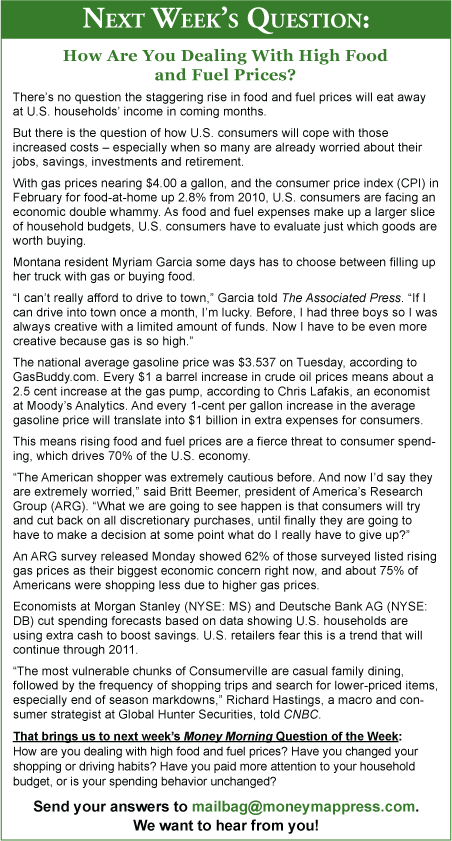Earthquakes and nuclear meltdowns in Japan, uprisings in the Middle East, scary job prospects, a gargantuan federal deficit, zooming gasoline prices, and soaring food prices ... the list of economic challenges facing the world is long and just seems to get longer.
It's tough to remember the last time U.S. consumers and investors faced so much uncertainty. But the worst thing is that there's no clear end in sight.
No wonder consumer confidence remains shaky, at best.
The Thomson Reuters/University of Michigan index of consumer sentiment in March fell to its lowest level in five months as higher gasoline prices lowered U.S. consumer confidence. Low confidence could mean a weak recovery, since consumer spending makes up 70% of the U.S. economy.
"We are in a confidence-driven recovery, not a jobs and income driven recovery," Christopher Low, chief economist at FTN Financial, told Reuters. "So if there's anything like this rise in oil and gas prices, things can turn sour pretty quickly."
Political turmoil in the Middle East and North Africa in recent weeks pushed oil prices into the triple digits, and gasoline prices rose more than 30 cents in the last month. Some economists believe that oil will hit $150 a barrel and pump prices will hit $4 a gallon.
Such a steep increase in oil and gasoline prices threatens U.S. growth - and your family's security. Stunted growth and a high unemployment rate could tip the American economy into its scariest state - stagflation, when rising prices are coupled with little or no economic growth.
The U.S. jobless rate fell to 8.9% in February from 9% the month before, but many economists don't expect it to continue on a steady decline.

"The unemployment rate is going to be very persistent," Edward Leamer, professor of economics at University of California-Los Angeles, told Businessweek. "We had a record number of permanent displacements in the recession."
Many U.S. investors are also concerned about the debt-laden federal, state and local governments. The federal government could hit the $14.29 trillion debt limit as early as next month. If the U.S. government can't borrow more and defaults on bonds, the fallout will hit all of us.
"It would weaken the position of the United States in world financial markets and it would tend to affect the standard of living of Americans as well because it might push the dollar down," University of Texas economist James Galbraith told American Public Media's "Marketplace" program
This prompted last week's Money Morning "Question of the Week": What are your five biggest worries? What are the five main economic or financial concerns that most concern those in your household? What issues plaguing the U.S. or global economy are most worrisome for you? Why do these issues hit closer to home on your economy radar? What are you doing to financial deal with these concerns?
The following lists are the top economic concerns on the minds of Money Morning readers.
And The Biggest Economic Worries Are...
My top five worries, in order of most to least:
1. It's always been about real estate. We need to resolve the housing debacle before consumers can free up discretionary income and feel good about the future.
2. Markets becoming highly correlated again. I'm worried there won't be anywhere to get return. Both bonds and stocks will get hammered in a "risk on risk off" scenario
3. No politician is willing to propose adult solutions to our deficit and entitlement programs and will only do so once the pain is truly ugly enough - spineless and gutless.
4. No coherent energy policy.
5. Global trade wars, protectionism, currency wars could evolve into real shooting wars
- Matt H.
My five biggest concerns starting with the largest are:
1. Congress will fail to take serious steps to cut spending. The plan of Rep. Paul Ryan, R-WI, is a serious step. Cuts less than $100 billion per year are not serious.
2. The U.S. Federal Reserve will keep creating massive bank reserves with QE3, 4, etc., trying to repair unemployment, but causing grave inflation in the process.
3. U.S. President Barack Obama will get re-elected and be able to continue his anti-business policies.
4. The Fed will not be able to unwind its massive balance sheet before serious inflation hits the United States.
5. The U.S. dollar becomes seriously devalued, thus reducing our own purchasing power, but also weakening U.S. influence in the world and restricting military options.
- Dom B.
Five things, eh? Current or long-range? Here's four:
1. Currently the loss of two-thirds of my Low Income Energy Assistance Program money, meaning the threat of my electricity being disconnected. Now where will I get the money to repair my leaky roof? Now all my 'extra' money must go to the electric bill. They raised my base rate and use rate last year and there is talk they will again this year. But, they lowered the rate for the biggest users! Sort of a tax break to the rich. This is upside-down. The biggest users should pay far more than anyone else. That will a) get them to conserve and b) encourage them to adopt solar/wind/bio-thermal. They are the ones with the money to invest in it. It doesn't have the payback value for us little users.
2. I am concerned about our polluted air and land. I can name a dozen friends with cancer. Most of the cancer is being caused by pollution related to the energies we are currently using. And not just the mercury, lead and arsenic from the coal, but the threat of nuclear fall out.
3. The pollution in our water: everything from hormones to chemicals from fracking, oil production, coal burning, industrial waste (fluorides) intentionally being added, and agricultural chemicals.
4. The collapse of our food supply. Loss of honeybees for pollination. Einstein said when they are gone, we have four years to live.
- Doris K.
War and oil. Isn't that cause for it all? Our deficit is out of control and until companies that are posting record gains begin hiring, nothing can be corrected. An economy cannot stimulate growth without money, and when more goes out than in, well... money is not produced without jobs. And tax revenue isn't made without jobs and spending.
To believe there is no money to reinvest in America in a legal, ethical, and legitimate way is just plain ignorant! Civil unrest is popping up not only the Middle East, but in Europe as well. What happens if Americans melt down? Scary, but people are having a very tough time.
What's the old saying? "We are just nine missed meals away from anarchy." I'm afraid it could erupt very easily with the increase in oil, now war, and prices to follow.
- Stacey T.
1. What will happen to the U.S. and world economy when the U.S. dollar is rejected as the world's reserve currency? America's childlike consumption has been based on continual expansion of the number of dollars in world circulation. We would be far better off to begin to reduce our government subsidies of virtually everything we buy, and allow prices to rise gradually and the federal budget to decline (not reduce the rate of increase) rather than to experience some cataclysmic financial event in the future. But I guess cataclysm is what motivates human nature-and feeds totalitarianism.
2. What will happen to Homo sapiens and countless other species when our planet's ecosystem becomes so compromised by human activity that it can no longer support enough consumption to satisfy the world human population?
3. What will happen to world political order when America's plunge into non-constitutional collectivism, blinded by the deceit of the politically correct and multicultural elite, results in an international oligarchy?
4. What kind of world are my grandkids going to have to live in thanks to the trillions of thoughtless decisions of all us loving parents and grandparents?
5. I'm too depressed to invent a fifth question.
- Paul D.

Well since I'm unemployed and haven't found a full time job in two years, I would say everything is my biggest concern. I can only see things getting worse based on the conversations I'm having with employers - not a good attitude towards the future. Most are either laying off or are closing up soon.
- Chris S.
Gasoline prices, gains in Brent crude oil prices, additional fiscal deficit for India.
- Punit S.
So far the biggest concern for the unstable economy is unemployment, but other things are also affecting the economy like gas and oil prices.
- Raja W.
It is overwhelming - my mind spins from one catastrophe to the next.
- Patricia W.
Be sure to answer next week's question: How are you dealing with high food and fuel prices? Have you changed your shopping or driving habits? Have you paid more attention to your household budget, or is your spending behavior unchanged?
Send your answers to [email protected].!
Is there a topic you want to see covered as a "Question of the Week" feature? Then let us know by e-mailing Money Morning at [email protected]. Make sure to reference "question of the week suggestion" in the subject line. We reserve the right to edit responses for length, grammar and clarity.
Thanks to everyone who took the time to participate - via e-mail or by posting their comments directly on the Money Morning Web site.]
News and Related Story Links:
- Money Morning:
Japan's Stock Market Plunges as Export Disruption Threatens Global Supply Chain - MarketWatch:
Japan stock crash raises fear of wider global impact - Marketplace:
U.S. could reach debt limit in early April - Reuters:
Instant View: University of Michigan consumer sentiment slumps - Businessweek:
What Will the Jobless Rate Be on Election Day? - Bloomberg News:
U.S. Economy: Unemployment Rate Unexpectedly Falls to 8.9% - The New York Times:
Republicans' Budget Man Draws Fire - Money Morning News Archive:
Question of the Week Feature


